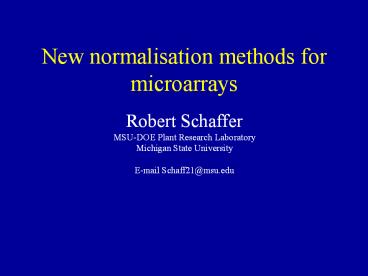New normalisation methods for microarrays PowerPoint PPT Presentation
Title: New normalisation methods for microarrays
1
New normalisation methods for microarrays
Robert Schaffer MSU-DOE Plant Research
Laboratory Michigan State University E-mail
Schaff21_at_msu.edu
2
Why normalise?
- During probe preparations technical variations
can be generated including - Dye properties
- Differences in dye incorporation
- Differences in scanning
3
Normalisation methods
- Most global normalisation methods assume the two
dyes are related by a constant factor - RkG
- Or in log space
- log2 R/G c
- clog2 k
4
Expected distribution of ratios
Slide A
log (Ratio)
log (Average intensity)
5
Some slides show an intensity bias
Slide B
Slide C
Slide D
Slide E
6
Traditional normalisation methods
Slide F no norm
Slide F log norm
Slide B no norm
Slide B log norm
7
Intensity dependent normalisation
- Premis that the majority of spots at any
intensity will have a ratio of 1 - Calculate a intensity dependent constant to
reduce intensity dependent bias - log2 R/G-c(A)
- R statistical software package has a lowess
function which performs local linear fits
(Speeds group) - Non linear method as an Excel macro (Bumgarners
group)
8
Terry Speeds groupUC berkeley/WEHI
Web site
http//www.stat.berkeley.edu/users/terry/zarray/Ht
ml/index.html
9
R
- Freeware
- Statistical software package
- http//www.r-project.org/
- Need to add a library module
- http//www.stat.berkeley.edu/users/terry/zarray/So
ftware/smacode.html - Quick and easy way to normalise data
10
R Gui interface
11
statistical microarray analysis (sma) module
- sma will normalise, compare slides, and do
statistical tests on data - Allows simultaneous multiple slide analysis
- To process the data
- load experiments into R
- describe slide printing configuration
- load experiments into a working data set
- Analyse data
12
Normalisation by lowess function
Slide F no norm
Slide F Lowess norm
Slide B no norm
Slide B Lowess norm
13
Local lowess normalisation removes gradient
effects
Slide D
Global lowess normalisation
No normalisation
Gradient on the array
Lowess normalisation by pin
Lowess normalisation by scale
14
M vs A plots do not show gradients
Global lowess normalisation
Slide D
No normalisation
Lowess normalisation by pin
Lowess normalisation by scale
15
background subtraction
Slide F with background subtracted
Slide F with NO background subtracted
Slide A with background subtracted
Slide A with NO background subtracted
16
Acknowledgements
- MSU Microarray group
- Ellen Wisman
- Robert Schaffer
- Jeff Landgraf
- Verna Simon
- Monica Accerbi
- Scott Lewis
- Kim Trouten
- David Green
- Pieter Steenhuis
Arabidopsis Functional Genomics Consortium Funded
by NSF

